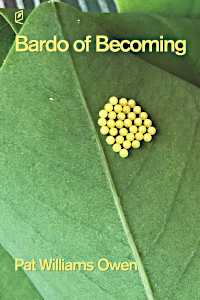|
|
|
|
Bardo of Becoming
Pat Williams Owen

 Bardo of Becoming by Pat Williams Owen takes us on a journey through the pages of a decades-old journal, a worn address book, and old photos of ancestors, as she revisits the memories of youth. From the sad loss of the family dog to the heartwarming recollection of riding in the car with her father, there is something in each of these moments that every reader can relate to.
Bardo of Becoming by Pat Williams Owen takes us on a journey through the pages of a decades-old journal, a worn address book, and old photos of ancestors, as she revisits the memories of youth. From the sad loss of the family dog to the heartwarming recollection of riding in the car with her father, there is something in each of these moments that every reader can relate to.

What Others Say About Bardo of Becoming

Bardo of Becoming is full of tender, questioning memories of a beloved father, a departed dog, a cherished partner—all of them gone now, leaving the writer with the small sensual details that make up a life; taste of cheese and crackers dissolving in the mouth, delicate scent of amaryllis, an ancient address book stuffed with post-it notes, all evidence of a life vibrantly lived, and living still in present time. In Owen's world the dead and the living rub shoulders, and the bardo of becoming is fresh as spring grass under a young girl's fingers, and always happening now.

—Alison Luterman

The poems in Pat Owen's new collection of memorable poems Bardo of Becoming reveal a speaker who's spent a lifetime paying attention and working to understand the meanings of her own story. How difficult it is to tell the truth about the self, yet I find in these poems a staggering honesty. Upon reflection, the woman speaking in these beautifully image-rich poems is an early feminist. As an elder, she is fiercely independent and fiercely attached to the present, to the natural world, the plants and, fittingly, the birds, of her environment, and to the people and words and ideas she's loved and loves, fleeting, she knows, but of inestimable value. I hope these poems reach many.

—Maureen Morehead

The Bardo, according to Tibetan Buddhism, is the realm between death and rebirth. Pat Owens new poetry collection, Bardo of Becoming, contains the reflections of a mature woman on the people and events that shaped her life and an awareness that she, like those before her, will eventually fade from view. It is, in part, a memoir in verse beginning with the evocative lines, What were the songs my father whistled / under his breath, what drove his heartbeat? / Isn't that tune floating now in my bloodstream? These poems are the product of a keen mind that records its insights with a perceptiveness that is both lyrical and precise. Owen sees the Buddha in the mundane and takes the reader with her on her journey toward enlightenment.

—Patricia Averbach

|
| |

What I Want to Remember
What were the songs my father whistled
under his breath, what drove his heartbeat?
Isn't that tune floating now in my bloodstream?
Didn't he write a poem for me when I was just a kid
about my dreaming of a hope chest and didn't
I look at him as though he spoke a foreign
language? Mama said she's not old enough
yet, and of course I was greener than
the magnolia in the front yard,
my soul un-sprouted, though it's clear
to me now I was growing toward
the strong trunk of independence
and not toward a man and a white dress.

|

|
|
|
|
|
|
|
|